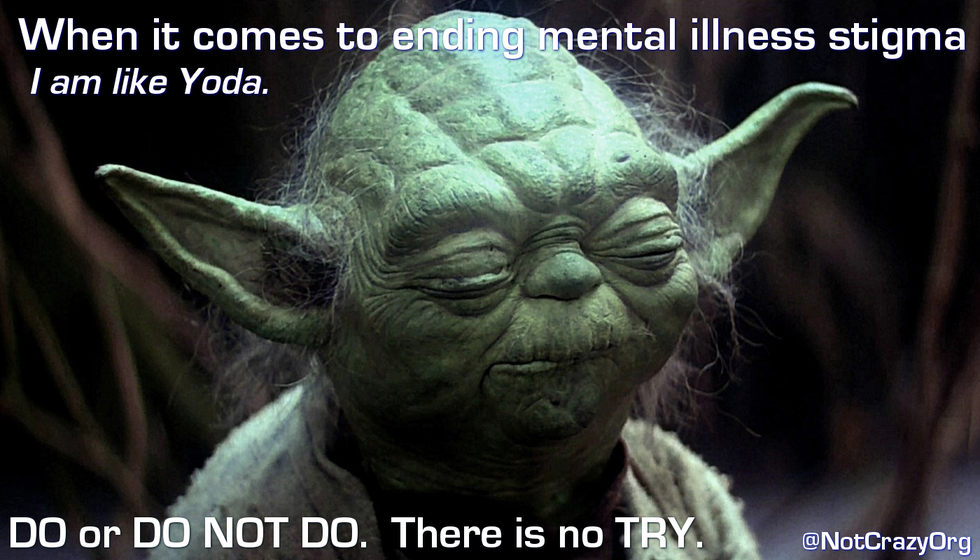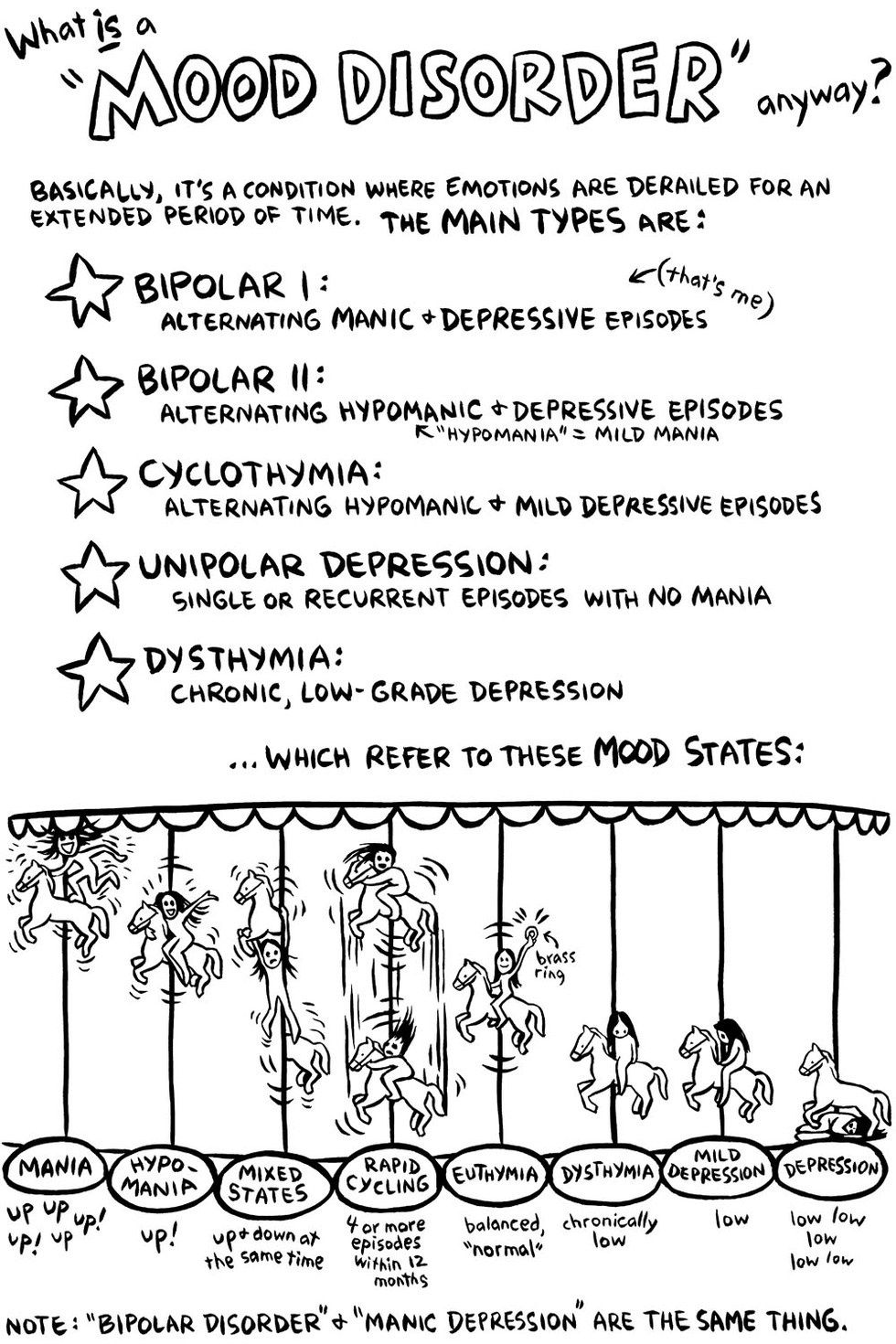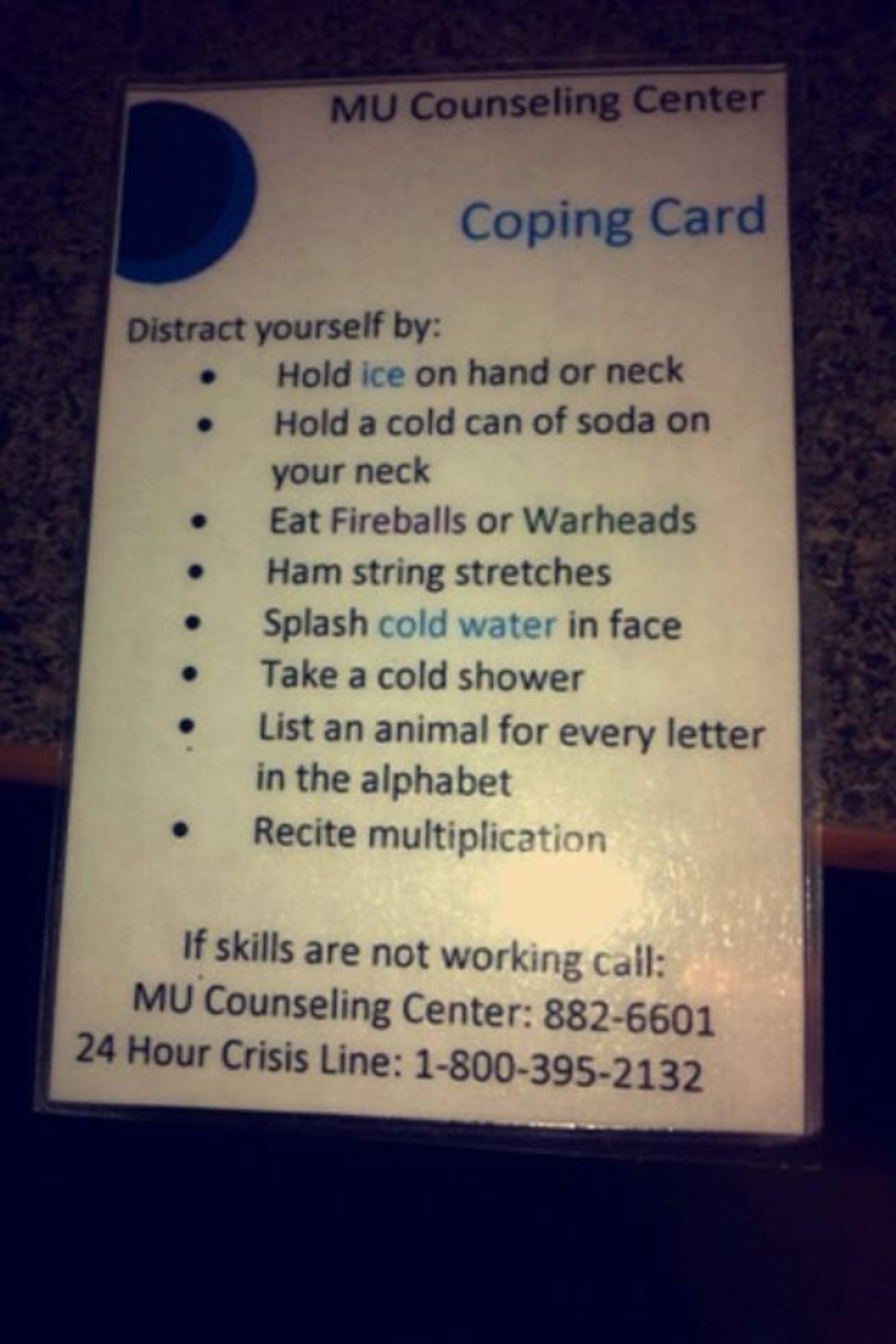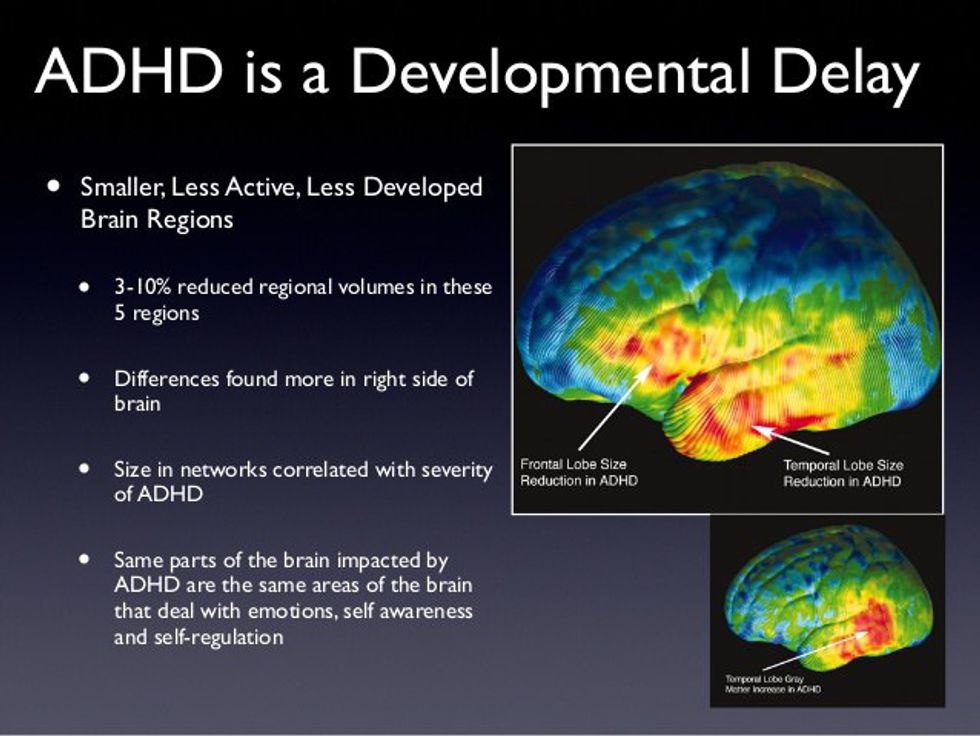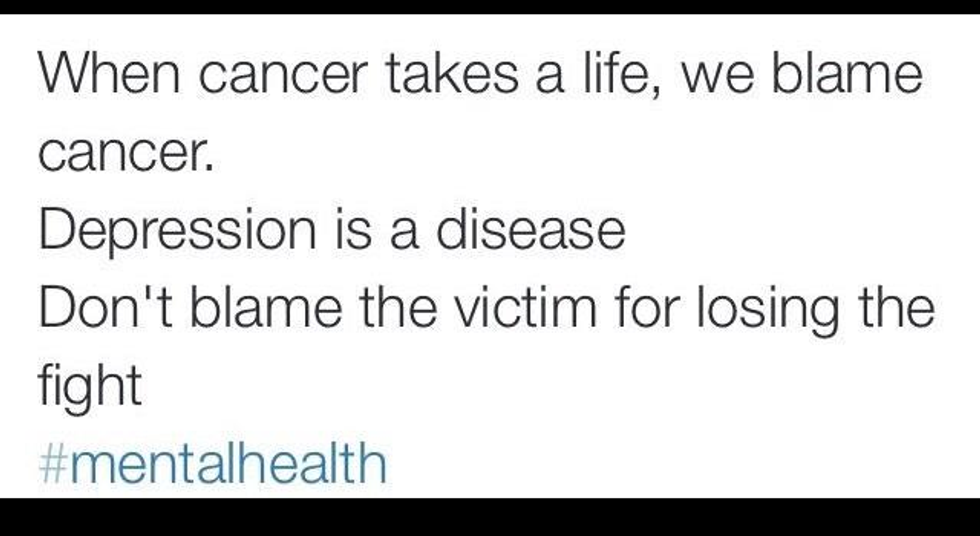In the media we've seen a growth in talk about mental illness, that I see as both good and bad. It is great light is being shined on this "controversial" topic, but the way people view mental health-related words and throw around the names of these illnesses in a commonplace manner is why I personally think suicide takes SO many lives.
There needs to be some understanding that there is a HUGE difference between suffering a chronic illness and a point in your life when you've shown symptoms. A forgotten fact is that mental illness doesn't discriminate. It is NOT circumstantial and that's the difference between a chronic mental illness and having an episode of a specific mental illness at some point in your life.
Here's a list of different mental illnesses. You'll see how they tend to be used in everyday conversation and how the context isn't necessarily how they should be used.
MDD (Major Depressive Disorder)
Words used in relation or substituted with illness: sad, lazy, over-emotional, dramatic.
Common phrase: "I've been depressed, I had a really bad break-up, so I feel the pain."
What separates depression from sadness is the length and the effect of it. Yes, we as people have been sad or have experienced grief from the loss of a loved one, or from a relationship ending, etc. But having chronic depression is not something that everyone feels, because it is a lifelong illness. A depressive disorder consists of "several" depressive episodes in one's lifetime, in which the depression stems from one's mood cycle, not from a event.
I was talking to my friend and the way she described her depression was, "Everything can be going well, and all of a sudden my mood changes, I feel numb, I have no joy in anything. Nothing feels good anymore, I can't remember what happiness feels like. But when I somehow get out of those dark clouds, I start to think, 'Maybe it was all in my head?'"
OCD (Obsessive-Compulsive Disorder)
Words used in relation or substituted with illness: neat freak, picky, erratic, dramatic.
Common phrase: "The fact that you need all your shoes to be organized by color is so OCD."
Contrary to popular opinion (yes BuzzFeed, I am calling YOU out), OCD is NOT a synonym for being "really clean." To first explain the compulsions, they are anything but "simple" or "glamorous." A well known compulsion is hand washing, due to fear of disease. The fear of contamination is so strong that they think that if they're not "entirely clean," they will die. These thoughts lead to washing and scrubbing hands so much that they become raw and bleed. To clarify, just because you wash your hands after you eat, or before you work does NOT mean you have OCD.
One side of OCD that is rarely ever talked about is the obsessive thoughts. This is a very difficult topic that is hard to understand, and I blame that on the lack of education. To me these obsessive thoughts are random, and they cause a lot of distress because they don't stay true to my own. Bear with me while I provide an example: a common obsessive thought is to worry that you'll hurt someone. What I need to clarify is that these are NOT homicidal thoughts, they are merely the thought pattern of "what if i did this," or "what if i did that," that come to your mind. When I tried to explain this to a woman doing a psychological test on me, I said the following: "I tried to force myself not to think these thoughts because I was afraid that by thinking them, I would accidentally say them out loud and everyone would think i was a psychopath."
"Obsessions are intrusive, irrational thoughts—unwanted ideas or impulses that repeatedly appear in a person's mind. Again and again, the person experiences disturbing thoughts, such as, "My hands must be contaminated; I need to wash them"; "I may have left the gas stove on; I need to go check it, fast"; "I am going to injure my child by accident; I need to be very careful or else something bad will happen." On one level, the person experiencing these thoughts knows their obsessions are irrational. But on another level, he or she fears these thoughts might be true. Trying to avoid such thoughts creates great anxiety, distress and dysfunction."
Bipolar I (Formerly known as Manic-Depression)
Bipolar II (Having more depressive episodes and only reaching hypomania)
Words in relation to or substituted with illness: crazy, unstable, dangerous, deviant.
Common phrase: "You're always so moody, stop being so bipolar."
*Bonus phrase.* My friend was in a toxic relationship and her partner broke up with her by saying, "You're bipolar, I can't let your genetics fuck up my kids, we have to break up, if you didn't have that, we could be together."
Due to its vague list of symptoms on popular websites and the large amount of people that self-diagnose, I would consider this one of the most wrongly interpreted mental illnesses. Whenever I do see my psychiatrist, I always ask her a ton of questions. The few psychiatrists I've had have told me time and time again that it's extremely hard to diagnose someone with Bipolar Disorder unless they're seen when experiencing a manic episode.
Mania is the complete opposite of depression, and it differs from person to person. You could feel like you're the most important person in the world, and you would do things you'd never do, whether it's having dozens of partners, making a drastic, dire decision, staying up for a week straight and feeling like you could stay up for another few, and engaging in drug binges.
The difference between a person when they're manic or "normal," is the manic version of them--is a complete switch, and there is something "off" about them.
The other reason that the bipolar disorder is so hard to describe is because as human beings, we don't have set emotions. But just because you switch to being sad and then being happy within a few days doesn't mean you're bipolar. Here is an artist's perception of bipolar disorder to reiterate that it's "cycles of mood," rather than a mood switch in seconds, like so many people think it is.
GAD (General Anxiety Disorder)
Words in relation to or substituted with illness: weak, unmotivated, dramatic.
Common phrase: "You don't have anxiety, you just need to relax"
To clarify, everyone has had anxiety. It's that tightening feeling in your chest and your throat, and the way you feel sick to your stomach. When it comes to someone with an anxiety disorder, that is their life 24/7. It's the fact that no matter how much you try to tell them to "just try" or "stop having a poor attitude," without medication and/or other treatment, it won't stop ruining their life. Having anxiety is the feeling that your body is in danger (fight-or-flight) you can't breathe, and you can't respond effectively.
The way my friend explained it to me was, "Having GAD is your mind constantly going to the worst case scenario. Thinking any negative thing could happen, even though it's pretty much impossible that any of it can occur."
ADHD (Attention Deficit Hyperactive Disorder)
Words in relation to or substituted with illness: lazy, impulsive, disruptive, stupid.
Common phrase: "Yeah I totally have ADHD, and when I took [amphetamine], I was so pumped. I finished studying AND ended up cleaning my house!"
A fact that still blows my mind, is when people who ACTUALLY have ADHD take their prescribed amphetamines, and instead of making them more hyper and all over the place, the prescriptions calm them down. It helps them get to a demeanor in which they can actually concentrate.
In the words of my psychiatrist when I made this revelation to her, "Since you don't have a normal brain, those impulses, and hyperactive parts about you are counterattacked with an amphetamine, and calm you down."
So as someone with ADHD, having the blessing of my medication, I now have the ability to sit still, actually focus for more than a few seconds, have a better memory, and better impulse control.
*Mini fact.* ADHD is commandingly misdiagnosed as Bipolar Disorder.
Suicide
The literal definition of suicide is, "the act of taking one's own life."
Common words associated with word: selfish, weak, sick, crazy.
Suicide is a very difficult topic to understand. It goes together with the fact that everyone grieves in their own way. I had one therapist tell me that suicide is one lesson that a person doesn't learn, and that stuck with me. I've attempted suicide, I've had several friends attempt suicide, so I want to explain this from the eyes of someone who used to think that suicide was the "only way out."
I thought that by taking my own life my pain would be gone, and the pain I caused others would be gone. If you haven't gone through this, you don't realize that there is this whole little world of people that feel the same. You learn that although those thoughts aren't "normal," no one is alone in thinking them. What I want to stress to anyone reading this, whether you are an attempted-suicide survivor or you lost a loved one to this illness, is that you should grieve in your own way. There isn't one way you "have to" act, there aren't certain things you "have to" say.
I want to remind people that when someone's mental illness takes their life, it doesn't mean your loved one was selfish. It wasn't anyone's fault. The depression took over their mindset, and their life.



